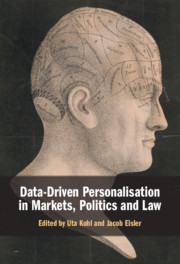Book contents
- Data-Driven Personalisation in Markets, Politics and Law
- Data-Driven Personalisation in Markets, Politics and Law
- Copyright page
- Contents
- Figures
- Tables
- Contributors
- Preface
- Part I Introduction: Theoretical Perspectives
- Part II Themes: Personal Autonomy, Market Choices and the Presumption of Innocence
- 5 Hidden Personal Insights and Entangled in the Algorithmic Model: The Limits of the GDPR in the Personalisation Context
- 6 Personalisation, Markets, and Contract: The Limits of Legal Incrementalism
- 7 ‘All Data Is Credit Data’: Personalised Consumer Credit Score and Anti-Discrimination Law
- 8 Sentencing Dangerous Offenders in the Era of Predictive Technologies: New Skin, Same Old Snake?
- Part III Applications: From Personalised Medicine and Pricing to Political Micro-Targeting
- Part IV The Future of Personalisation: Algorithmic Foretelling and Its Limits
- Index
6 - Personalisation, Markets, and Contract: The Limits of Legal Incrementalism
from Part II - Themes: Personal Autonomy, Market Choices and the Presumption of Innocence
Published online by Cambridge University Press: 09 July 2021
- Data-Driven Personalisation in Markets, Politics and Law
- Data-Driven Personalisation in Markets, Politics and Law
- Copyright page
- Contents
- Figures
- Tables
- Contributors
- Preface
- Part I Introduction: Theoretical Perspectives
- Part II Themes: Personal Autonomy, Market Choices and the Presumption of Innocence
- 5 Hidden Personal Insights and Entangled in the Algorithmic Model: The Limits of the GDPR in the Personalisation Context
- 6 Personalisation, Markets, and Contract: The Limits of Legal Incrementalism
- 7 ‘All Data Is Credit Data’: Personalised Consumer Credit Score and Anti-Discrimination Law
- 8 Sentencing Dangerous Offenders in the Era of Predictive Technologies: New Skin, Same Old Snake?
- Part III Applications: From Personalised Medicine and Pricing to Political Micro-Targeting
- Part IV The Future of Personalisation: Algorithmic Foretelling and Its Limits
- Index
Summary
The legal approach to regulating data-driven personalisation has relied heavily on extending and reusing legal categories and concepts – in particular, the idea of privacy of personal information and the legitimating role of consent in permitting the use of personal information – that were originally devised to deal with a very different problem. This chapter argues that this approach is fundamentally flawed for two reasons. Firstly, data-driven personalisation – unlike the traditional core of privacy – is deeply enmeshed in contractual relationships, and both the gathering and the use of data are mediated by contractual terms. As this chapter shows, the result is that ‘privacy’ and ‘consent’ do not provide an adequate evaluative framework to model or mitigate the deleterious impact of data-driven personalisation on individuals. Secondly, consent derives its normative force from the presumption that it is necessarily autonomy-enhancing. As this chapter shows, however, data-driven personalisation has a strong derelationalising effect which erodes rather than enhances the data subject’s autonomy, calling into question the assumptions underpinning privacy-based approaches. The chapter concludes by arguing that dealing with these problems requires adopting a new, more substantive approach, which works to explicitly restrict the processes, structures, and purposes through which and for which personalisation is used.
Keywords
- Type
- Chapter
- Information
- Data-Driven Personalisation in Markets, Politics and Law , pp. 108 - 123Publisher: Cambridge University PressPrint publication year: 2021
- 2
- Cited by

